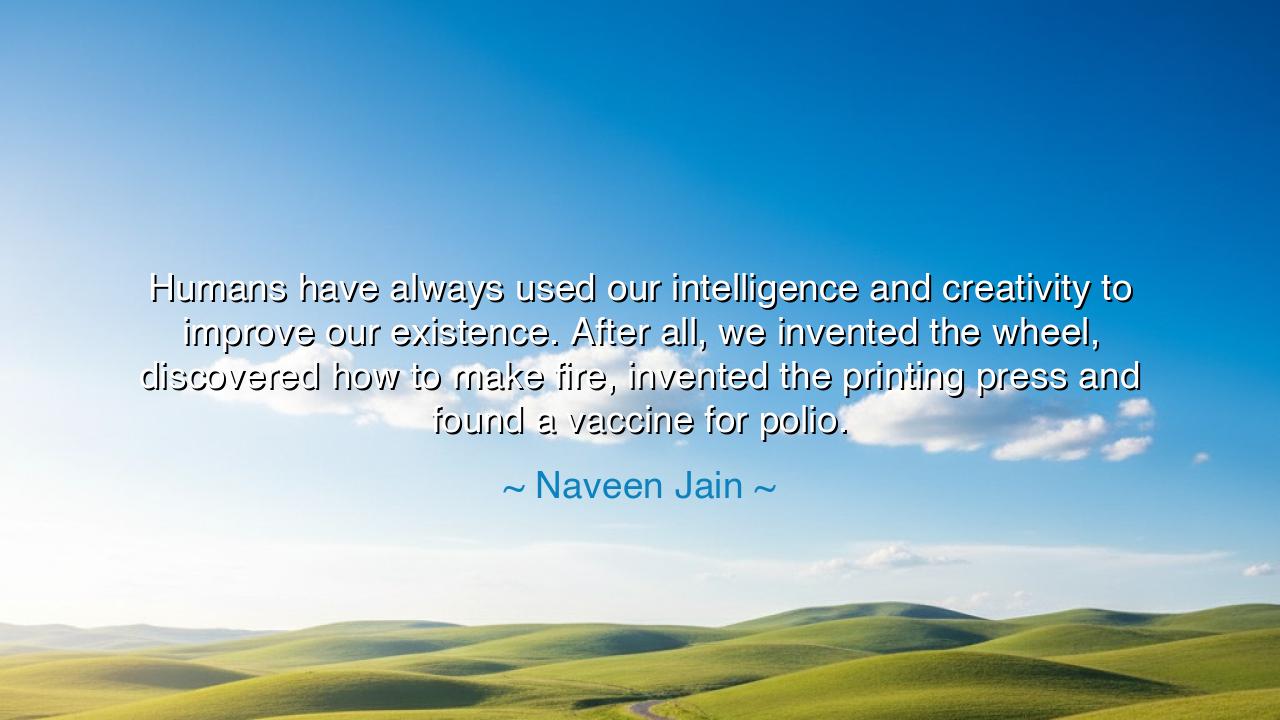
Humans have always used our intelligence and creativity to
Humans have always used our intelligence and creativity to improve our existence. After all, we invented the wheel, discovered how to make fire, invented the printing press and found a vaccine for polio.






“Humans have always used our intelligence and creativity to improve our existence. After all, we invented the wheel, discovered how to make fire, invented the printing press and found a vaccine for polio.” Thus spoke Naveen Jain, the modern visionary and entrepreneur, whose words echo both reverence for humanity’s past and hope for its future. In this statement, he calls us to remember the sacred power that lies within the human spirit — the eternal partnership between intelligence and creativity, the twin forces that have carried mankind from the shadows of survival to the dawn of civilization. His words are not mere praise, but a reminder: that progress is the natural expression of our divine curiosity, and that we, the children of thought, are the architects of our own destiny.
The origin of this quote reflects Jain’s philosophy as an innovator who believes in the limitless potential of the human mind. Born in India and rising to global prominence as a pioneer in technology and space exploration, he has dedicated his life to solving the grand challenges of humanity — from healthcare to energy, from education to interplanetary existence. When he speaks of fire and the wheel, of the printing press and the vaccine for polio, he summons the great milestones of our shared history, each a testament to what happens when human intelligence is guided by vision. To Jain, the story of progress is not one of luck or chance, but of courage — the courage to imagine something greater than what is, and to work tirelessly until it becomes real.
To invent fire was not simply to create warmth or light; it was to claim mastery over nature, to kindle the first spark of civilization. To shape the wheel was to set humanity in motion — to transform stillness into journey, isolation into connection. The printing press, born from the mind of Johannes Gutenberg, shattered the silence of ignorance, scattering knowledge like seeds to every corner of the earth. And when Jonas Salk discovered the vaccine for polio, he did not merely conquer a disease; he liberated generations from fear, proving once more that compassion and intellect, when united, can rewrite the fate of millions. In each of these moments, humanity’s intelligence was not cold calculation, but a flame lit by wonder — a sacred yearning to make life better not only for oneself, but for all.
Naveen Jain’s reflection carries a truth that transcends time: that every human advance begins as a dream, a question, a rebellion against limitation. The cave-dweller who struck flint to stone and the scientist who sequenced the human genome are bound by the same spirit — the refusal to accept the impossible. This creative defiance is the heartbeat of progress. It is what allows the weak to become strong, the lost to find purpose, and the small to leave an eternal mark upon the vastness of existence. Jain calls us to recognize this lineage, to see ourselves as heirs of that same fire — to honor our ancestors not by worshiping their inventions, but by daring to invent anew.
And yet, there is humility in his words. For while we celebrate our intelligence, Jain reminds us that its true purpose is service. The wheel, the press, the vaccine — none were ends in themselves, but gifts to uplift the human condition. The power of creativity lies not in creation alone, but in creation for good. Intelligence without compassion breeds destruction; creativity without conscience builds towers without foundations. Thus, the measure of human progress is not only in what we make, but in why we make it — whether it expands freedom, deepens understanding, and brings light to the world.
Let us look, too, to those whose genius shaped humanity’s destiny through service. Consider Florence Nightingale, who used not the power of invention, but the intelligence of compassion, to reform medicine and save the wounded. Or Mahatma Gandhi, whose creative vision of nonviolent resistance transformed not machines, but hearts. Their legacy, like that of scientists and inventors, reminds us that intelligence takes many forms — and that every act of progress, whether physical or moral, arises from the same creative fire. Humanity’s genius is not only in the hand that builds, but in the heart that dreams and the spirit that endures.
So let this be the lesson of Naveen Jain’s words: never doubt the sacred force within you. The same intelligence that lit the first fire burns still in every mind; the same creativity that moved the stars of invention lives in every soul. Do not use your gifts merely to survive — use them to improve existence, to heal, to uplift, to imagine a brighter world. Cultivate your mind not for pride, but for purpose. Look to the problems of your age and ask, as your ancestors once did: How can this be made better? For every age waits for its dreamers, and every generation holds within it the power to remake the world.
In the end, the message of Naveen Jain is both a celebration and a challenge. We are the inheritors of fire, the keepers of the wheel, the stewards of knowledge, and the healers of tomorrow. The task of progress has not ended — it has only passed into our hands. Let us then rise as those before us rose, guided by intelligence and creativity, by service and hope, and let the dreams of humanity continue — through us — to burn ever brighter across the face of the earth.






AAdministratorAdministrator
Welcome, honored guests. Please leave a comment, we will respond soon